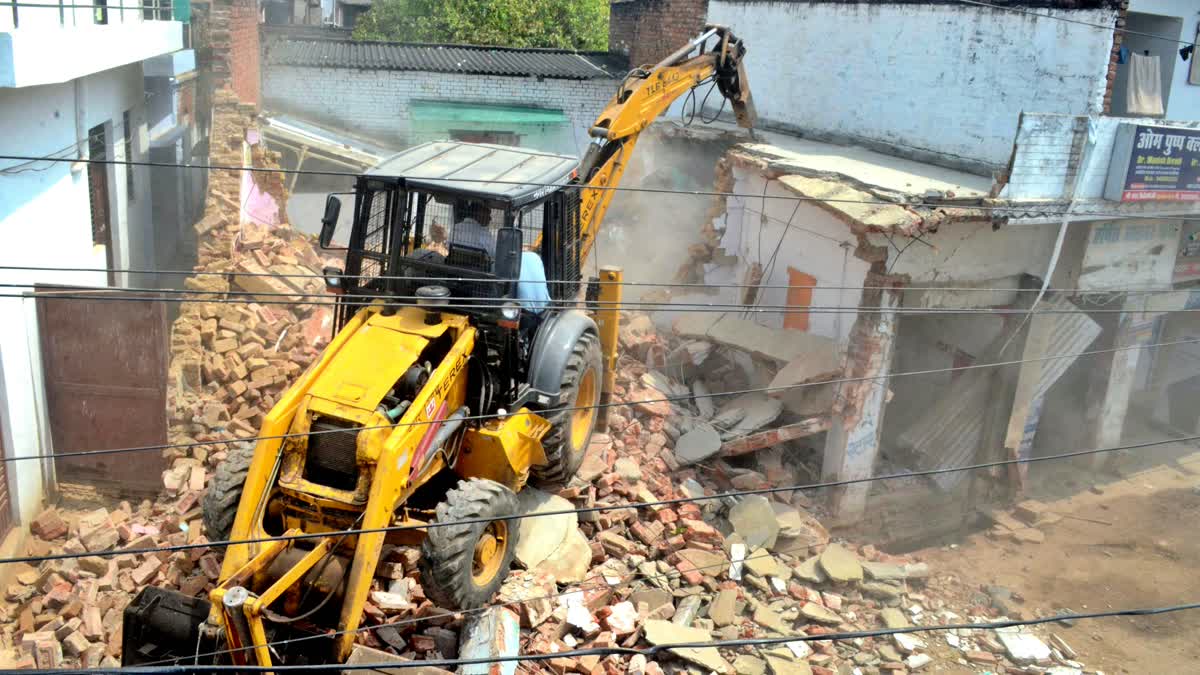New Delhi: The Supreme Court on Wednesday directed the Uttar Pradesh authorities to compensate a man, whose house was razed in 2019 for a road widening project, with Rs 25 lakh, saying, “you can't come with a bulldozer and demolish the house overnight”.
The apex court minced no harsh words for the authorities for making an announcement on the site before the demolition and termed it “lawlessness”.
The matter came up before a three-judge bench led by Chief Justice of India DY Chandrachud and comprising justices J B Pardiwala and Manoj Misra. The bench criticised the state authorities for its high-handed approach. "You can't come with a bulldozer and demolish the house overnight," said the bench. The apex court termed it lawlessness, and added, “walking into somebody's house and demolishing it without notice".
The apex court asked the UP chief secretary to conduct an inquiry into the matter pertaining to the illegal demolition in Maharajganj district.
The bench made these observations while hearing a suo motu writ petition registered in 2020 based on a letter complaint sent by Manoj Tibrewal Akash, whose house in District Maharajganj was demolished in 2019. Senior advocate Siddharth Bhatnagar and advocate Shubham Kulshreshtha represented Akash before the apex court.
The state government had argued that the Akash had encroached public land. "You say that he was an encroacher of 3.7 metres. We take it, we are not giving him a certificate for it. But, how can you start demolishing people's houses like that?” the bench asked.
It is completely high-handed, the bench said, questioning the state authorities on due process to be followed. It pointed out that it has an affidavit that says no notice was issued, and added, “you only went to the site and informed the people through loudspeaker.”
The apex court was informed that over 100 other constructions were also demolished and people were just given information through public announcements.
Read More | |
The apex court stressed that the authorities are supposed to give time to families to vacate and further questioned, “what about the household articles? There has to be due process followed”.
The bench cited a report of the National Human Rights Commission (NHRC) that, at the highest, there was an encroachment of 3.70 metres but it was not a justification to demolish the entire house. The commission had recommended the grant of interim compensation to the petitioner, registration of FIR in the issue, and initiation of departmental action against the officers.
The apex court directed that the copy of the court order should be circulated to all states/union territories.
In a detailed order, the top court said, "Bulldozer justice is simply unacceptable under the rule of law. If it were to be permitted the constitutional recognition of the right to property under Article 300A would be reduced to a dead letter. Officials of the state who carry out or sanction such unlawful action must be proceeded against for disciplinary action. Their infractions of law must invite criminal sanctions. Public accountability for public officials must be the norm. Any action in respect of public or private property must be backed by due process of law."
The top court said: "Justice through bulldozers is unknown to any civilized system of jurisprudence. There is a grave danger that if high-handed and unlawful behaviour is permitted by any wing or officer of the state, demolition of citizens’ properties will take place as a selective reprisal for extraneous reasons. Citizens’ voices cannot be throttled by a threat of destroying their properties and homesteads."
The bench said the ultimate security which a human being possesses is to the homestead.
"The law does not undoubtedly condone unlawful occupation of public property and encroachments. There are municipal laws and town-planning legislation which contain adequate provisions for dealing with illegal encroachments," it said.
"Where such legislation exists the safeguards which are provided in it must be observed. We propose to lay down certain minimum thresholds of procedural safeguards which must be fulfilled before taking action against properties of citizens. The state must follow due process of law before taking action to remove illegal encroachments or unlawfully constructed structures," observed the bench.



